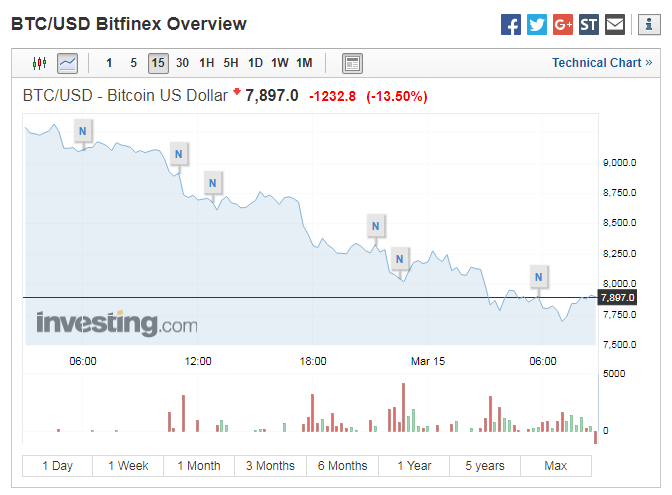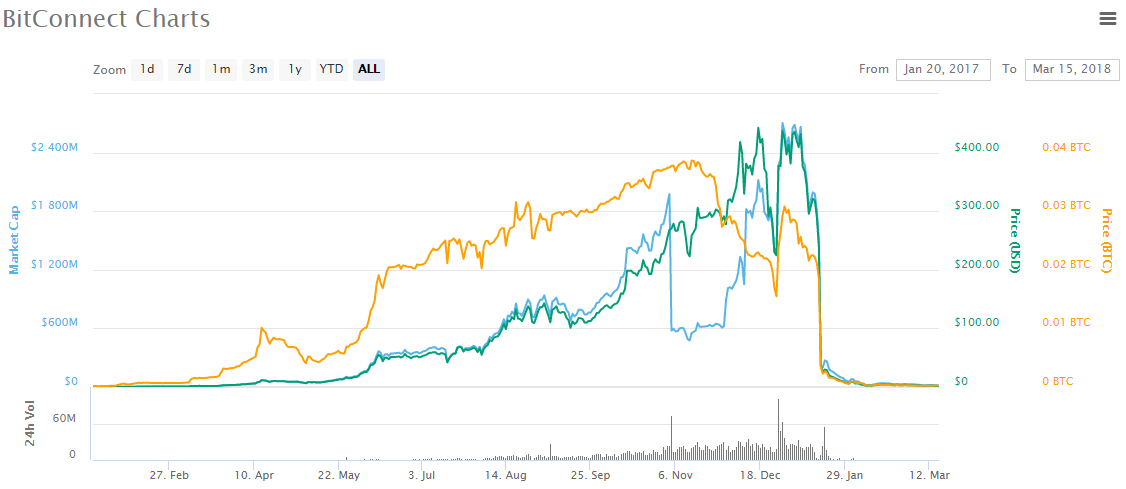Why Trading in Bitcoin or Other Cryptocurrencies is Playing with Fire
You're probably aware that investing in bitcoin is risky in general, but let's take a look at the specific reasons why you could get burned.


Profit and prosper with the best of Kiplinger's advice on investing, taxes, retirement, personal finance and much more. Delivered daily. Enter your email in the box and click Sign Me Up.
You are now subscribed
Your newsletter sign-up was successful
Want to add more newsletters?

Delivered daily
Kiplinger Today
Profit and prosper with the best of Kiplinger's advice on investing, taxes, retirement, personal finance and much more delivered daily. Smart money moves start here.

Sent five days a week
Kiplinger A Step Ahead
Get practical help to make better financial decisions in your everyday life, from spending to savings on top deals.

Delivered daily
Kiplinger Closing Bell
Get today's biggest financial and investing headlines delivered to your inbox every day the U.S. stock market is open.

Sent twice a week
Kiplinger Adviser Intel
Financial pros across the country share best practices and fresh tactics to preserve and grow your wealth.

Delivered weekly
Kiplinger Tax Tips
Trim your federal and state tax bills with practical tax-planning and tax-cutting strategies.

Sent twice a week
Kiplinger Retirement Tips
Your twice-a-week guide to planning and enjoying a financially secure and richly rewarding retirement

Sent bimonthly.
Kiplinger Adviser Angle
Insights for advisers, wealth managers and other financial professionals.

Sent twice a week
Kiplinger Investing Weekly
Your twice-a-week roundup of promising stocks, funds, companies and industries you should consider, ones you should avoid, and why.

Sent weekly for six weeks
Kiplinger Invest for Retirement
Your step-by-step six-part series on how to invest for retirement, from devising a successful strategy to exactly which investments to choose.
The two biggest players for digital advertising may have finally halted the blockchain hype.
In March 2018, Google updated its financial services advertising policy. With these changes, ads for “Cryptocurrencies and related content (including but not limited to initial coin offerings, cryptocurrency exchanges, cryptocurrency wallets, and cryptocurrency trading advice)” will no longer be displayed in Google's ad network. Facebook had already banned cryptos and ICOs (initial coin offerings) from its platform in January.
How did the market react?
From just $107.88 $24.99 for Kiplinger Personal Finance
Become a smarter, better informed investor. Subscribe from just $107.88 $24.99, plus get up to 4 Special Issues

Sign up for Kiplinger’s Free Newsletters
Profit and prosper with the best of expert advice on investing, taxes, retirement, personal finance and more - straight to your e-mail.
Profit and prosper with the best of expert advice - straight to your e-mail.
Almost all cryptocurrencies lost 10% to 20% in value during the 24 hours after the latest announcement. This includes all coins with the biggest market cap (Bitcoin, Ethereum, Ripple, Bitcoin Cash, Litecoin) and also those that were expected to gain a lot of momentum in 2018 (NEO, IOTA, OmiseGO).

This clearly shows one of the risks you take when trading with cryptocurrencies: It's an extremely volatile market, and depending on when you buy, you may experience considerable losses within a couple of days or even hours.
Of course, the opposite situation has also occurred. At one point in 2017 the value for bitcoin soared more than 1,500% since the beginning of the year. People suddenly became millionaires, because they invested in Bitcoin at the right time — before the real hype started.
I think we can all agree that trading cryptos is not for the faint of heart. Apart from extreme volatility, what are some of the other potential risks associated with dabbling in cryptocurrencies?
Total Loss & Market Manipulation
First, digital currencies can suddenly become worthless if investor interest dissipates. In fact, bitcoin discloses this warning in its FAQ. Even Deutsche Bank has listed a bitcoin crash as one of the risks to markets in 2018.
Some coin exchanges allow you to set stop-loss orders, which could be considered to help deal with that risk. With a stop-loss order, you automatically sell at a pre-determined lower price to avoid losing all your money. Unfortunately, there’s a problem with that strategy: market manipulation.
Using stop-loss orders is common practice in the stock market. For cryptocurrencies; however, they might not work as intended because the market is unregulated. Investors who hold large amounts of coins can easily manipulate the market by selling their coins with the goal to trigger the stop-losses. Afterward, they can simply repurchase their coins at a lower price and pocket the difference.
Technical Issues
In November 2017 the Guardian published an article with the headline ''$300m in cryptocurrency' accidentally lost forever due to bug.” Author Alex Hern outlined that more than $300 million invested in Ether (Ethereum's coin) was locked up in a number of digital multi-signature wallets and later accidentally destroyed by a user in a series of bugs. Neither the coins nor the money could be recovered.
Ironically, a hacker did not cause this issue. It was a technical issue, and certainly not first time such an incident has occurred.

Hacker Attacks
It seems like the rise of cryptocurrencies was exactly what hackers have been waiting for all their lives.
In order to keep digital currency coins secure, they are encrypted, which makes a lot of sense. The problem is that a coin does not have your name written on it. The encrypted code identifies the currency itself, but not the owner. This means that whoever holds the code automatically becomes the owner, even if the code was stolen.
Above that, once an exchange or a digital wallet got hacked and all coins are gone, it's very hard or even impossible to retrieve them.
These are some of the attacks that have happened in the last years:
- 2014: The world's largest Bitcoin exchange, Mt. Gox, went into bankruptcy after being hacked with $460 million (approx. 740,000 Bitcoins) stolen.
- March 4, 2014: 12.3% of the BTC on Poloniex was stolen.
- Aug. 2, 2016: 119,756 Bitcoins were stolen from bitfinex due to a security breach.
- Jan. 27, 2018: Cryptocurrency exchange Coincheck (Tokyo) said that the day before a hacker had stolen about 58 billion yen ($532 million) worth of its holdings in NEM.
Risks Associated with Coin Exchanges
Apart from getting hacked, these are some of the risks associated with coin exchanges:
1. They May Disappear
GBL, a bitcoin exchange based in China, went offline for no apparent reason in November 2013. Later it became clear that GBL's operators ran off with $4.1 million worth in Bitcoin.
Another example for a coin exchange that simply disappeared is MyCoin, with $387 million stolen in investor funds.
2. They May Get Seized
In July 2017, Bitcoin exchange platform BTC-e was seized by the FBI due to money-laundering crimes.
3. They May Disable/Freeze Your Account
This has happened to Coinbase users.
Impending Government Regulations
In theory, governments can make trading cryptocurrencies — such as bitcoin — illegal, which is the case in Algeria, Bolivia, Ecuador, Bangladesh, Nepal and Macedonia, but that’s not set in stone. Investors should monitor the situation, because just as trading cryptocurrencies is dynamic, the regulations are as well.
The Chinese government has announced that it will eventually close down domestic coin exchanges.
Investor Sentiment
For billionaire investor Mark Cuban, bitcoin's value “is a function of supply and demand. It doesn’t really do anything else.” Chances are that investor sentiment drops over time, as there are a number of altcoins that have many more purposes than peer-to-peer payments alone. Take Ethereum as an example. (Ethereum is an open software platform that uses blockchain technology to help develop and take advantage of decentralized applications. The bitcoin blockchain helps monitor ownership of digital currency (bitcoins), whereas the Ethereum blockchain supports the programming code of decentralized applications.) Or they bait crypto enthusiasts with lower transaction fees.
Ponzi Schemes
The BitConnect token was priced at more than $400 before BitConnect shut down after being accused of running a Ponzi scheme.
Since then the token price has plummeted:

What Financial Authorities Say
The Financial Industry Regulatory Authority (FINRA), a not-for-profit organization authorized by Congress, aims to protect investors by making sure that the financial industry “operates fairly and honestly.”
In 2014 FINRA published an Investor Alert listing the risks that come with buying, selling and using cryptocurrencies, and bitcoin in particular. Apart from the fact that exchanges can be hacked and coins stolen, FINRA reminded investors that cryptocurrencies are not legal tender. If no business or individual accepts them for payment, they eventually become worthless. FINRA also warned of bitcoin-related scams.
Jay Clayton, chairman of the U.S. Securities and Exchange Commission (SEC), stated in December 2017 that “to date no initial coin offerings have been registered with the SEC.”
Clayton also pointed out that if the trading activity happens on platforms outside the U.S., it may not be possible for regulators, such as the SEC, to pursue bad actors and recover stolen or lost investment funds.
The moral of the story: It’s important to understand that trading cryptocurrencies can be a high risk-reward game. Don’t play with fire.
Profit and prosper with the best of Kiplinger's advice on investing, taxes, retirement, personal finance and much more. Delivered daily. Enter your email in the box and click Sign Me Up.

Marguerita M. Cheng is the Chief Executive Officer at Blue Ocean Global Wealth. She is a CFP® professional, a Chartered Retirement Planning Counselor℠ and a Retirement Income Certified Professional. She helps educate the public, policymakers and media about the benefits of competent, ethical financial planning.
-
 Nasdaq Leads a Rocky Risk-On Rally: Stock Market Today
Nasdaq Leads a Rocky Risk-On Rally: Stock Market TodayAnother worrying bout of late-session weakness couldn't take down the main equity indexes on Wednesday.
-
 Quiz: Do You Know How to Avoid the "Medigap Trap?"
Quiz: Do You Know How to Avoid the "Medigap Trap?"Quiz Test your basic knowledge of the "Medigap Trap" in our quick quiz.
-
 5 Top Tax-Efficient Mutual Funds for Smarter Investing
5 Top Tax-Efficient Mutual Funds for Smarter InvestingMutual funds are many things, but "tax-friendly" usually isn't one of them. These are the exceptions.
-
 Social Security Break-Even Math Is Helpful, But Don't Let It Dictate When You'll File
Social Security Break-Even Math Is Helpful, But Don't Let It Dictate When You'll FileYour Social Security break-even age tells you how long you'd need to live for delaying to pay off, but shouldn't be the sole basis for deciding when to claim.
-
 I'm an Opportunity Zone Pro: This Is How to Deliver Roth-Like Tax-Free Growth (Without Contribution Limits)
I'm an Opportunity Zone Pro: This Is How to Deliver Roth-Like Tax-Free Growth (Without Contribution Limits)Investors who combine Roth IRAs, the gold standard of tax-free savings, with qualified opportunity funds could enjoy decades of tax-free growth.
-
 One of the Most Powerful Wealth-Building Moves a Woman Can Make: A Midcareer Pivot
One of the Most Powerful Wealth-Building Moves a Woman Can Make: A Midcareer PivotIf it feels like you can't sustain what you're doing for the next 20 years, it's time for an honest look at what's draining you and what energizes you.
-
 I'm a Wealth Adviser Obsessed With Mahjong: Here Are 8 Ways It Can Teach Us How to Manage Our Money
I'm a Wealth Adviser Obsessed With Mahjong: Here Are 8 Ways It Can Teach Us How to Manage Our MoneyThis increasingly popular Chinese game can teach us not only how to help manage our money but also how important it is to connect with other people.
-
 Looking for a Financial Book That Won't Put Your Young Adult to Sleep? This One Makes 'Cents'
Looking for a Financial Book That Won't Put Your Young Adult to Sleep? This One Makes 'Cents'"Wealth Your Way" by Cosmo DeStefano offers a highly accessible guide for young adults and their parents on building wealth through simple, consistent habits.
-
 Global Uncertainty Has Investors Running Scared: This Is How Advisers Can Reassure Them
Global Uncertainty Has Investors Running Scared: This Is How Advisers Can Reassure ThemHow can advisers reassure clients nervous about their plans in an increasingly complex and rapidly changing world? This conversational framework provides the key.
-
 I'm a Real Estate Investing Pro: This Is How to Use 1031 Exchanges to Scale Up Your Real Estate Empire
I'm a Real Estate Investing Pro: This Is How to Use 1031 Exchanges to Scale Up Your Real Estate EmpireSmall rental properties can be excellent investments, but you can use 1031 exchanges to transition to commercial real estate for bigger wealth-building.
-
 Should You Jump on the Roth Conversion Bandwagon? A Financial Adviser Weighs In
Should You Jump on the Roth Conversion Bandwagon? A Financial Adviser Weighs InRoth conversions are all the rage, but what works well for one household can cause financial strain for another. This is what you should consider before moving ahead.